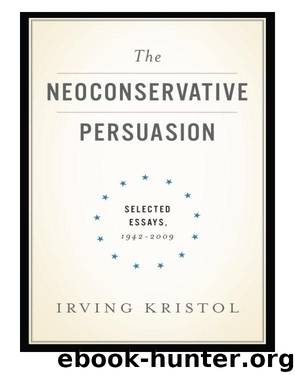The Neoconservative Persuasion by Kristol Irving;

Author:Kristol, Irving;
Language: eng
Format: epub
Publisher: Basic Books
Published: 2010-12-12T16:00:00+00:00
1996
The Neoconservative Persuasion
What exactly is neoconservatism? Journalists, and now even presidential candidates, speak with an enviable confidence on who or what is “neoconservative,” and seem to assume the meaning is fully revealed in the name. Those of us who are designated as “neocons” are amused, flattered, or dismissive, depending on the context. It is reasonable to wonder: is there any “there” there? Even I, frequently referred to as the “godfather” of all those neocons, have had my moments of wonderment. A few years ago I said (and, alas, wrote) that neoconservatism had had its own distinctive qualities in its early years, but by now had been absorbed into the mainstream of American conservatism. I was wrong, and the reason I was wrong is that, ever since its origin among disillusioned liberal intellectuals in the 1970s, what we call neoconservatism has been one of those intellectual undercurrents that surface only intermittently. It is not a “movement,” as the conspiratorial critics would have it. Neoconservatism is what the late historian of Jacksonian America, Marvin Meyers, called a “persuasion,” one that manifests itself over time, but erratically, and one whose meaning we clearly glimpse only in retrospect.
Viewed in this way, one can say that the historical task and political purpose of neoconservatism would seem to be this: to convert the Republican Party, and American conservatism in general, against their respective wills, into a new kind of conservative politics suitable to governing a modern democracy. That this new conservative politics is distinctly American is beyond doubt. There is nothing like neoconservatism in Europe, and most European conservatives are highly skeptical of its legitimacy. The fact that conservatism in the United States is so much healthier than in Europe, so much more politically effective, surely has something to do with the existence of neoconservatism. But Europeans, who think it absurd to look to the United States for lessons in political innovation, resolutely refuse to consider this possibility.
Neoconservatism is the first variant of American conservatism in the past century that is in the “American grain.” It is hopeful, not lugubrious; forward-looking, not nostalgic; and its general tone is cheerful, not grim or dyspeptic. Its twentieth-century heroes tend to be TR, FDR, and Ronald Reagan. Such Republican and conservative worthies as Calvin Coolidge, Herbert Hoover, Dwight Eisenhower, and Barry Goldwater are politely overlooked. Of course, those worthies are in no way overlooked by a large, probably the largest, segment of the Republican Party, with the result that most Republican politicians know nothing and could not care less about neoconservatism. Nevertheless, they cannot be blind to the fact that neoconservative policies, reaching out beyond the traditional political and financial base, have helped make the very idea of political conservatism more acceptable to a majority of American voters. Nor has it passed official notice that it is the neoconservative public policies, not the traditional Republican ones, which result in popular Republican presidencies.
One of these policies, most visible and controversial, is cutting tax rates in order to stimulate steady economic growth.
Download
This site does not store any files on its server. We only index and link to content provided by other sites. Please contact the content providers to delete copyright contents if any and email us, we'll remove relevant links or contents immediately.
| Anarchism | Communism & Socialism |
| Conservatism & Liberalism | Democracy |
| Fascism | Libertarianism |
| Nationalism | Radicalism |
| Utopian |
The Secret History by Donna Tartt(19026)
The Social Justice Warrior Handbook by Lisa De Pasquale(12182)
Thirteen Reasons Why by Jay Asher(8883)
This Is How You Lose Her by Junot Diaz(6870)
Weapons of Math Destruction by Cathy O'Neil(6260)
Zero to One by Peter Thiel(5782)
Beartown by Fredrik Backman(5733)
The Myth of the Strong Leader by Archie Brown(5491)
The Fire Next Time by James Baldwin(5422)
How Democracies Die by Steven Levitsky & Daniel Ziblatt(5210)
Promise Me, Dad by Joe Biden(5139)
Stone's Rules by Roger Stone(5078)
A Higher Loyalty: Truth, Lies, and Leadership by James Comey(4946)
100 Deadly Skills by Clint Emerson(4911)
Rise and Kill First by Ronen Bergman(4775)
Secrecy World by Jake Bernstein(4738)
The David Icke Guide to the Global Conspiracy (and how to end it) by David Icke(4696)
The Farm by Tom Rob Smith(4500)
The Doomsday Machine by Daniel Ellsberg(4481)
